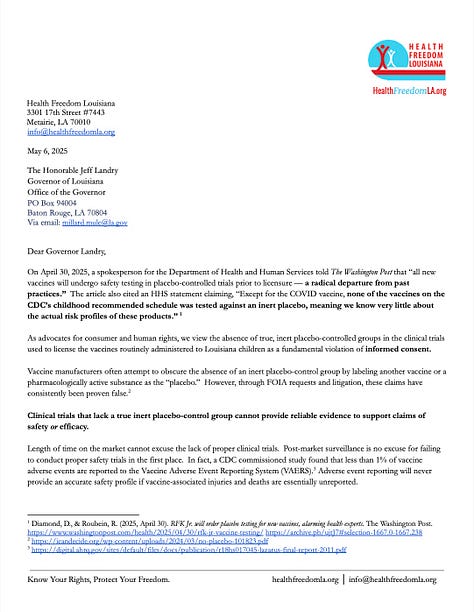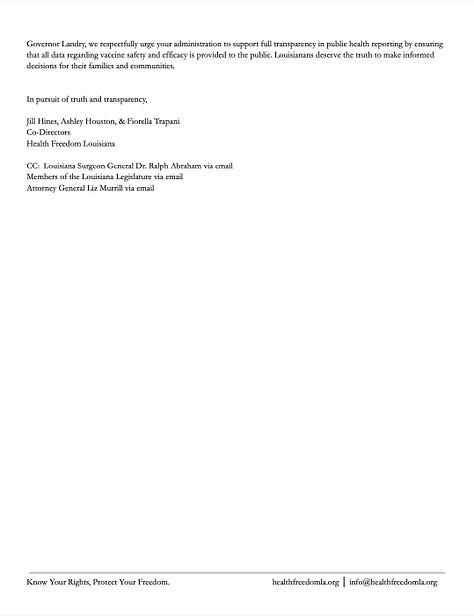No Placebos, No Proof: Health Freedom Louisiana Warns Governor Landry of Gaps in Vaccine Safety Testing
CDC's Recommended Childhood Vaccines are licensed without placebo-controlled clinical trials.
Physicians are concerned about the lack of placebo-controlled clinical trials—but not for the reason you may think.
The lack of inert, placebo-controlled groups in the clinical trials used to license vaccines on the CDC’s Recommended Childhood Vaccine Schedule has always been a serious concern of Health Freedom Louisiana and our members. The omission of this critical element in the clinical trials used to determine the safety and efficacy of the drugs routinely injected into infants and children defies logic and ethics. In the absence of inert placebo-controlled trials, vaccine safety and efficacy claims lack meaningful context. The appropriate scientific question becomes: “Safer and more efficacious than what control or condition?”
Headlines last week reflected the concern of physicians and scientists around the world when a Health and Human Services spokesperson indicated that going forward, vaccine clinical trials would include a true inert placebo-controlled group— “a radical departure from past practices.” But they weren’t concerned for the same reason we are—namely, as a serious violation of ethics and informed consent. Instead, the concern was for the preservation of the vaccine program as evidenced by the quote from vaccine industry spokesperson, Dr. Paul Offit.
“You are watching the gradual dissolution of the vaccine infrastructure in this country,” Dr. Paul Offit, director of the Vaccine Education Center at Children’s Hospital of Philadelphia, told The Post. “The goal is to make vaccines less available and less affordable.”
Would you inject a drug into your newborn knowing it had never undergone a placebo-controlled clinical trial?
As we have written about extensively in the past, the vaccines routinely given to infants and children were licensed without adequate clinical trials sufficient to determine safety or efficacy. When pharmaceutical companies are allowed to use another vaccine or an active ingredient like vaccine adjuvants as “placebos,” instead of a true, inert placebo like saline, it is ridiculous to think a safety profile can be established.
In the chart below, the non-profit Informed Consent Action Network (ICAN) provides a visual display of the “placebos” used in each clinical trial. The current vaccines on the market are in the yellow boxes at the top, and the “placebo” that was used for each clinical trial is indicated in the orange box below.
Look closely and you’ll see vaccines that had no “placebos” at all—like Ipol and MMR II.
Interestingly, the DTP (diphtheria, tetanus, pertussis) vaccine — so injurious it was the catalyst for the passage of NCVIA and is no longer used in America — was used as the placebo in the clinical trials for the two DTaP vaccines on the market today, Infanrix and Daptacel.
How can the safety of a drug be determined if the control group does not include an inert placebo?
Another resource from ICAN is the placebo chart below, which includes the “placebo” used in each clinical trial, as well as the age administered, brand name of the vaccine, the length of safety review, and the source for the information. The length of the safety review in these clinical trials is also critically insufficient. Under 21 CFR § 201.57(c)(7), vaccine manufacturers are required to disclose “only those adverse events for which there is some basis to believe there is a causal relationship between the drug and the occurrence of the adverse event.” The shorter the safety review, the less likely those pesky adverse events will be evident. Take a look at Ipol, it’s in the 4th row down. The safety review for this vaccine, which had no “placebo” at all, was only three days long.
HFL Co-Director Jill Hines had the honor of presenting this information and more to the Governor’s Children’s Cabinet Advisory Council in January of this year, which you can read about HERE. The news of these gaps in vaccine safety, like the lack of placebo-controlled clinical trials, is slowly making its way into mainstream publications now that Secretary Kennedy is firmly ensconced at Health and Human Services.
We took the opportunity to make Governor Landry aware of the issue of placebos in a letter sent on May 6th, which reads:
Dear Governor Landry,
On April 30, 2025, a spokesperson for the Department of Health and Human Services told The Washington Post that “all new vaccines will undergo safety testing in placebo-controlled trials prior to licensure — a radical departure from past practices.” The article also cited an HHS statement claiming, “Except for the COVID vaccine, none of the vaccines on the CDC’s childhood recommended schedule was tested against an inert placebo, meaning we know very little about the actual risk profiles of these products.”
As advocates for consumer and human rights, we view the absence of true, inert placebo-controlled groups in the clinical trials used to license the vaccines routinely administered to Louisiana children as a fundamental violation of informed consent.
Vaccine manufacturers often attempt to obscure the absence of an inert placebo-control group by labeling another vaccine or a pharmacologically active substance as the “placebo.” However, through FOIA requests and litigation, these claims have consistently been proven false.
Clinical trials that lack a true inert placebo-control group cannot provide reliable evidence to support claims of safety or efficacy.
Length of time on the market cannot excuse the lack of proper clinical trials. Post-market surveillance is no excuse for failing to conduct proper safety trials in the first place. In fact, a CDC-commissioned study found that less than 1% of vaccine adverse events are reported to the Vaccine Adverse Event Reporting System (VAERS). Adverse event reporting will never provide an accurate safety profile if vaccine-associated injuries and deaths are essentially unreported.
Additionally, data suggest that the sharp rise in chronic childhood diseases and developmental delays correlates with the growing number of vaccines and doses added to the CDC’s recommended childhood vaccine schedule:
Currently, the CDC recommends 81 doses of 15 different vaccines by age 18. A post-market surveillance system like VAERS is not designed to evaluate the long-term health outcomes of vaccinated populations. For example, a natural experiment took place in Guinea-Bissau when infants were vaccinated based on their birthdates, unintentionally creating a control group. A 2017 study published in EBioMedicine found the infants who received the DTP vaccine had a five to ten times higher all-cause mortality rate compared to those who had not yet been vaccinated. These findings raise serious concerns about the long-term safety of vaccines when not tested against an inert placebo prior to licensure.
Alarmingly, the same DTP vaccine referenced in the study above was the “placebo” in the clinical trials for most pertussis-containing vaccines currently on the market in the U.S., including those given to infants—Daptacel and Infanrix.
Second only to school-aged children, vaccines—lacking adequate pre-licensure safety data and proper placebo-controlled trials—are mandated for healthcare professionals and clinical students, raising serious ethical and legal concerns regarding informed consent and bodily autonomy. Now that the federal government has acknowledged the substandard procedures used to license these products, we strongly urge the immediate restoration of informed consent—before hospitals and clinics face legal consequences for imposing unsafe and coercive working conditions. Not only is flu vaccination associated with greater susceptibility to other non-influenza infections, including coronaviruses, new data indicates flu vaccination increases the risk of contracting flu by 27%.
Last September, Louisiana’s Surgeon General, Dr. Ralph Abraham, addressed the legislature and stated the only way to regain the public’s trust after the covid debacle was to “simply tell the truth.” We contend that the only way to make Louisiana healthy will be to simply tell the truth about vaccine safety and efficacy. Now is the time to be honest and open with all Louisianans. Public health agencies and officials across the state continue to make unsubstantiated claims of vaccine safety and efficacy. It is imperative that Louisianans are provided with accurate, unbiased information about these products considering the lack of reliable data and the immunity from liability these products are afforded under federal law.
Governor Landry, we respectfully urge your administration to support full transparency in public health reporting by ensuring that all data regarding vaccine safety and efficacy is provided to the public. Louisianans deserve the truth to make informed decisions for their families and communities.
In pursuit of truth and transparency,
Jill Hines, Ashley Houston, & Fiorella Trapani
Co-Directors
Health Freedom Louisiana



Unlike the CDC, state and local health agencies have a fiduciary duty to their citizens to prioritize transparency, protect individual rights, and ensure that public health policies are grounded in fully informed, voluntary consent. If there are no placebos in vaccine clinical trials, claims of safety cannot be made about them.
Our advocacy is only possible with your help! THANK YOU!!









